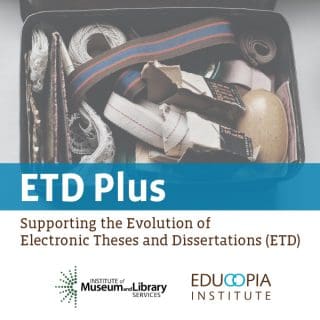November 28, 2017
Electronic Theses and Dissertations (ETD)plus Virtual Workshops
Training Students to Manage ETDs and Research Outputs
The ETD+ Virtual Workshop Series, taught by Dr. Katherine Skinner, is a set of free introductory training resources on crucial data curation and digital longevity techniques. Focusing on the Electronic Thesis and Dissertation (ETD) as a mile-marker in a student’s research trajectory, it provides in-time advice to students and faculty about avoiding common digital loss scenarios for the ETD and all of its affiliated files.
Access the materials now using the links below!
Copyright
The Copyright workshop addresses the basics of copyright and how it relates to the research outputs students produce. Discussion topics include how decisions you make about your own copyright may impact the future of your own research outputs; how copyright affects different content types; how copyright may impact how you include others’ works within your own (including those you have previously published); and the range of Creative Commons licenses that are available as an option for declaring your intentions as an author.
- Copyright Workshop Recording (16 min.)
- Copyright Slides
- Copyright Guidance Brief
- Copyright Handout
- Copyright Evaluation Survey
Data Organization
The Data Organization workshop covers data management principles and data organization standards. Discussion topics include techniques and resources you may use to ensure your data will be readable and understandable in the future; where students can look for field-specific guidance about analysis methods, services, tools, and repositories; and the roles played by common tools such as data dictionaries and readme files.
- Data Organization Workshop Recording (21 min.)
- Data Organization Slides
- Data Organization Guidance Brief
- Data Organization Handout
- Data Organization Evaluation Survey
File Formats
The File Formats workshop will help students think through the pros and cons of different file formats in terms of file longevity and accessibility. Discussion topics include file format risk factors; resources and options to guide file format selection; the differences between proprietary and open formats; the usefulness of different formats in different disciplinary contexts; and how to save final versions of content in multiple formats in order to mitigate risk.
- File Formats Workshop Recording (19 min.)
- File Formats Slides
- File Formats Guidance Brief
- File Formats Handout
- File Formats Evaluation Survey
Metadata
The Metadata workshop covers the basics of metadata in the context of ETDs and their affiliated research outputs (e.g., datasets, a/v recordings, code, etc.). Discussion topics include how to employ good practices in metadata creation; where to find and edit/repair auto-generated metadata; and how to build and use an inventory to record additional metadata about supplementary files.
- Metadata Workshop Recording (15 min.)
- Metadata Guidance Brief
- Metadata Slides
- Metadata Handout
- Metadata Evaluation Survey
Storage
The Storage workshop provides an overview of storage options and provides guidance to students about how to optimize storage to improve the longevity and accessibility of their research outputs. Discussion topics include how to pick storage types (and how many to pick!); risk factors impacting storage and how to mitigate them; how to create back-ups and address security concerns; and tools that aid in managing stored files over time.
- Storage Workshop Recording (15 min.)
- Storage Guidance Brief
- Storage Slides
- Storage Handout
- Storage Evaluation Survey
Version Control
The Version Control workshop discusses the fundamentals of version control, or the process of managing changes to files over time. Discussion topics include versioning and revision histories; naming conventions and folder/directory structures; and tools promoting version control (e.g., Git and Subversion).
- Version Control Workshop Recording (13 min.)
- Version Control Slides
- Version Control Guidance Brief
- Version Control Handout
- Version Control Evaluation Survey
What these workshops are:
An open set of six webcasts, plus guidance briefs, slideshows, and handouts for each of six topics: Copyright, Data Organization, File Formats, Metadata, Storage, and Version Control. Each of these webcasts can stand alone, and these are not designed to be taken in a particular order.
Who these workshops are for:
Anyone may freely use these materials. We especially recommend their use by students seeking practical advice about digital content management and by administrators, faculty, and librarians teaching students these skills.
Give us feedback (Please)
Like the modules? Hate them? Think they’re unique? Redundant? Because these materials have been produced under a grant-funded project, we are requesting feedback that we can share with our funder and that we can use to improve the Toolkit. Please help us to refine the workshops and report back to our funder about how and where they are being used. Please answer the surveys for each module, which are listed above (no more than 5 min each, we promise!).
About the ETDplus Project
The ETDplus project is helping institutions ensure the longevity and availability of ETD research data and complex digital objects (e.g., software, multimedia files) that comprise an integral component of student theses and dissertations. The project was generously funded by the Institute of Museum and Library Services (IMLS) and led by the Educopia Institute, in collaboration with the NDLTD, HBCU Alliance, bepress, ProQuest, and the libraries of Carnegie Mellon, Colorado State, Indiana State, Morehouse, Oregon State, Penn State, Purdue, University of Louisville, University of Tennessee, the University of North Texas, and Virginia Tech.
Acknowledgements
This project was made possible in part by the Institute of Museum and Library Services.
